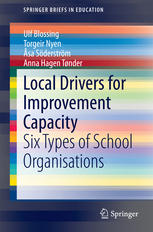

Most ebook files are in PDF format, so you can easily read them using various software such as Foxit Reader or directly on the Google Chrome browser.
Some ebook files are released by publishers in other formats such as .awz, .mobi, .epub, .fb2, etc. You may need to install specific software to read these formats on mobile/PC, such as Calibre.
Please read the tutorial at this link: https://ebookbell.com/faq
We offer FREE conversion to the popular formats you request; however, this may take some time. Therefore, right after payment, please email us, and we will try to provide the service as quickly as possible.
For some exceptional file formats or broken links (if any), please refrain from opening any disputes. Instead, email us first, and we will try to assist within a maximum of 6 hours.
EbookBell Team

4.3
8 reviewsThis book presents systematically six types of schools, with different improvement capacities. Different schools have different capacities for school improvement, depending on the school infrastructure, norms and routines for the improvement process, improvement roles, and improvement history. The organisation of the improvement capacity is understood on the basis of sensemaking processes among teachers and school leaders. The book focuses on the challenges for each type of school in their improvement work, and which situations and circumstances they need to take into account. The school types are illustrated with detailed descriptions of six schools, coming from an evaluation of a Norwegian school development program. The book fills a need in school organisations to have concrete illustrations from similar schools of how teacher teams are organised, how leadership is exercised and processes are organised in their efforts of improving the organisation and building a complex and effective capacity. Schools’ improvement capacity has become an important feature in school management and leadership as well as in research as western states have decentralised governance to the local level. The expectations on school leaders as well as on teachers are high when it comes to improve their schools to raise student outcome. Accounts of professional school cultures and professional learning communities often describe in an overall perspective the ideal school where such an improvement capacity is in work. However, accounts of the many ways of organising the capacity which perhaps are not all in all ideal or effective also contribute to the knowledge of the local school process.